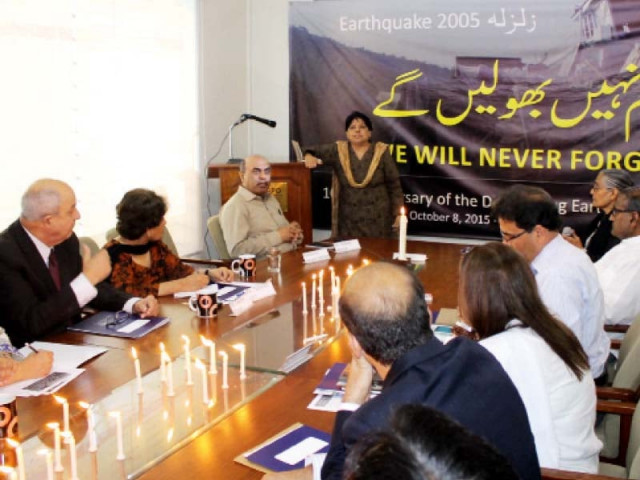Disaster management: Call for proactive approach instead of responsive steps
Participants voice concern over lack of disaster impact assessment mechanism

Poet Kishwar Naheed pays tributes to the victims of earthquake at a discussion to commemorate the disaster that shook the country on October 8, 2005. PHOTO: EXPRESS
The event was organised to commemorate the 10th anniversary of the devastating earthquake that shook Kashmir, parts of Khyber-Pakhtunkhwa and Islamabad at the Strengthening Participatory Organisation (SPO), a local NGO office.
They were of the view that the government and NGOs needed to take up a proactive approach to disaster management instead of reactive measures.
After a decade of the disaster and facing floods frequently, Pakistan lacks effective data collection and information dissemination mechanisms, they said.
The SPO Chief Executive, Naseer Memon questioned how, and why, a 7.6 magnitude earthquake caused such a huge deaths and destruction, while only a few people lost their lives in an earthquake of magnitude 9 in Japan.
Memon, voiced concern at lack of disaster impact assessment mechanism before a development plan that involves mega constructions, calling for strict adherence to standard building codes. He urged the civil society to raise voice against what he termed the nexus of contractors, builders and building control authorities.
Joint Action Committee for Emergency Response member Naheed Aziz said, “Research shows that while situation at some families has improved, a significant portion of affected communities are yet to recover from losses they incurred.”
Samiullah from the UN Office for the Coordination of Humanitarian Affairs (OCHA) enumerated the various agency-recommended building codes and regulations, urgent need assessment tools, early recovery policies, guidelines and coordination with the government and civil society.
Earthquake Reconstruction and Rehabilitation representative Shazia Harris emphasized the importance of an inclusive approach, collaboration and coordination among the various government entities, knowledge management and shared data sets of vulnerable groups and professionals.
Human rights activist Tahira Abdullah questioned why almost all government primary and secondary schools collapsed, in contrast to a few private schools.
She wondered why the same government engineering firm was awarded the reconstruction contract. Abdullah said that disasters were a global phenomenon but preventing death, injury and destruction, required bona fide intent, honesty and integrity.
She called for establishing a strong database as even 10 years after the tragedy there was no consensus on number of deaths that occurred in 2005.
Rescue 1122
The Punjab Emergency Service (Rescue 1122) commemorated the National Disaster Awareness Day to remember the 2005 earthquake tragedy. An awareness event at Central Rescue Station Rawalpindi was organised followed by a walk to Faizabad.
Published in The Express Tribune, October 9th, 2015.



















COMMENTS
Comments are moderated and generally will be posted if they are on-topic and not abusive.
For more information, please see our Comments FAQ